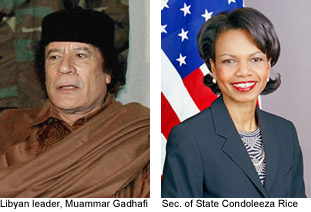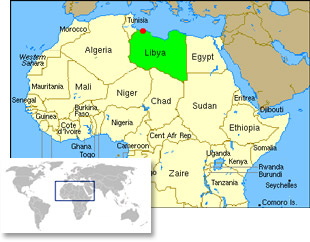
UNITED NATIONS (FinalCall.com) – When Secretary of State Condoleezza Rice greeted Libyan Leader Muammar Gadhafi in Tripoli on September 5, a three-decade old chapter of animosity between the two nations was closed.
Ms. Rice became the first U.S. secretary of state to visit the North African nation since John Foster Dulles in 1953; and the highest-ranking U.S. official visitor since then Vice President Richard Nixon’s visit in 1957. The U.S. withdrew its ambassador in 1972; then designated Libya a “state sponsor of terrorism” in 1979–normal relations were restored in 2006.
In 2003, President Gadhafi renounced terrorism and gave up his nation’s nuclear weapons programs.
National Public Radio reported in the days leading up to the meeting that State Dept. officials had been talking about Libya as George Bush’s foreign policy success story. According to the BBC, Libyan state media said President Bush had sent President Gadhafi a message, saying he hoped relations between the two nations would continue to improve.
JANA, the official Libyan news agency, reported that the “two nations have closed all outstanding issues.”
The Libyan president and the secretary of state participated in iftar, the traditional meal breaking the daily fast observed by Muslims during the holy month of Ramadan. News agencies, prior to Ms. Rice’s visit, constantly referred to a comment made by the Libyan leader to Al Jazeera. “I support my darling Black African woman … I love her very much. I admire her, and I’m proud of her, because she’s a Black woman of African origin,” said Col. Gadhafi concerning Sec. Rice.
The two officials and their entourages met in the same government compound in central Tripoli bombed by the U.S. in 1986. Dozens were killed in that attack, including the Libyan president’s adopted daughter. It is reported that the president presented Ms. Rice with a mandolin.
“I told President Gadhafi that I look forward to the Libyan people and the American people getting to know each other better,” Ms. Rice said in a statement released Sept. 6 on the State Dept. website. She expressed hope that the U.S. would have an ambassador in Tripoli soon.
Another statement on the State Dept. website said the visit to Libya “signifies a new chapter in U.S.-Libyan bilateral relations.”
The BBC reported “many in Libya hope that U.S.-Libyan relations will only improve in the long-run.”

Ms. Rice, on the website, said she had explained to Abdulrahman Muhammad Shalgam, secretary of the General People’s Committee for Foreign Relations and International Cooperation, that “the United States desires to move forward in a positive way toward a positive relationship.”
However, there are critics of the visit and those who warn the Bush administration to go slow with Libya.
The Carnegie Endowment, a think-tank in Washington, D.C., warned against falling into business-as-usual relations with Libya. “We urge the U.S. to use its limited but growing influence in Libya to support growth in non-governmental sectors and not with the regime’s status quo. The U.S. should set clear objectives aimed at helping the Libyan people,” the think tank said.
Objections to the visit came from some of the families of the 180 Americans killed in the 1988 bombing of a Pan Am jet above Lockerbie, Scotland, which killed 270 people. A deal was signed in Tripoli by U.S. and Libyan officials in August that a fund would be established for American families in the Lockerbie bombing, the 1986 Berlin disco bombing that killed three and wounded over 200 people, and for the Libyan families in the 1986 American air attack. Objections were based on the fact that Libya had yet to make a deposit into the fund.
Ms. Rice told reporters before leaving that the Bush administration expressed sympathy with the families but it was time to move on.
The JANA news agency reported that Ms. Rice spent eight hours in Libya–three hours longer than originally planned.
Ms. Rice said, “We did indeed have a wide-ranging discussion on issues such as counterterrorism, how Libya sees its future, human rights and Africa. We talked a good deal about Africa and the issue of AFRICOM–what the United States was doing with AFRICOM–were we looking to military bases on the African continent. I said to leader Gadhafi that we clearly weren’t getting through about what we meant for AFRICOM—that this is to help Africans help themselves—in peacekeeping, in counterterrorism work.”
“That is a huge development, that Pres. Gadhafi would tackle the issue of AFRICOM with her,” stated Emira Woods of Washington, D.C.-based Foreign Policy In Focus told The Final Call. “This shows a new stage in U.S.-African affairs for the future generations to come. It shows that there is great concern about U.S. plans for military expansion in Africa in light of the occupation of Iraq,” Ms. Woods added.
The secretary of state also reported that she tackled such issues economic cooperation, Iraq, Palestine/Lebanon, U.S.-Syria relations and oil with her counterpart, Mr. Shalgam.
According to an April story in the U.K.-based International Herald Tribune, top oil executives had been prodding the Bush administration for a year to make amends with Tripoli, at stake was Libya’s 40 billion barrels of oil reserves.
The Wall Street Journal reported recently that U.S. energy and defense companies were critical of the slow pace of Washington’s diplomatic rapprochement with Libya, fearing the Europeans and Chinese were getting the lucrative Libyan contracts. The Journal noted that Libya’s economic growth had been rated at nine percent.
The U.S. Energy Information Administration reports that U.S. companies such as Amerada Hess, Exxon Mobil, Chevron and Occidental have been taking out of Libya an average of 85,500 barrels of oil per day since 2006, but without the longterm contracts they desire.
The Journal added that Ms. Rice’s trip to Libya “is expected to accelerate economic engagement” between the two nations. The State Dept. website said that Trade and Investment Framework Agreements with Libya to enforce bilateral trade between the nations, particularly in oil and natural gas sectors, had been signed.
However, Ms. Rice found herself facing reporters’ questions about the oil contracts as she said Washington rapprochement with OPEC member Libya is not solely based on the U.S.’s need for oil, according to Reuters.
“It has a much broader potential then just energy,” Ms. Rice said, but added, “Libya, owners of one of Africa’s largest oil reserves–could help in terms of the world’s fuel supplies.”
According to Reuters, Ms. Rice revealed that U.S. companies were looking to compete for contracts in a wide range of sectors in Libya such as agriculture, water, telecommunications, transportation, power, banking, construction and health services.
Therein lies the difference in today’s landscape between the U.S. and Libya, stated Michael Renner, a senior researcher at Worldwatch Institute and a policy analyst for Foreign Policy in Focus. “The U.S. can no longer do business through divide and conquer in the Arab world, because of nations like India, China and the European Union. There is now real competition for resources,” he told The Final Call.
Mr. Renner said Libya had entered a new paradigm of doing business with the West. “Libya has a better ownership position because of the competition and the liberalization of their economic policies; thereby they can demand and get the types of contracts that allow them to gain better profits,” Mr. Renner stressed.
There is however, another important event relating to Libya that needs reporting.
Italian Prime Minister Silvio Berlusconi has signed an agreement to pay Libya $5 billion as part of a deal to resolve colonial-era disputes. (See related story on page 12.)
Libya was occupied by Italy in 1911 before it was a colony in the 1930s, gaining independence in 1951.
Libya has become the first African nation to be compensated by a former colonial master.
Related links:
Italy to pay reparations to Libya $5B for colonial rule (FCN, 09-16-2008)
‘Rogue’ no more; U.S. eyes oil in Libya, Sudan (FCN, 07-02-2002)
Mandela’s Libya visit raises questions about U.S. policy (FCN, 11-04-1997)












